Afibrinogenemia (AFG)
Afibrinogenemia (AFG)
General description
Typical signs of bleeding disorders are prolonged clotting time, cord or mucosal bleeding and haematomas. They can lead to uncontrolled severe bleeding upon surgeries, injuries or spontaneous. In Dachshunds, a genetic variant of the FGA (fibrinogen alpha chain) gene has been found to be associated with afibrinogenemia, leading to a severe form of bleeding tendency.
Breeds
Dachshund (Dackel), Long-Haired Dachshund, Short-Haired Dachshund, Wire-Haired Dachshund
Order details
| Test number | 8737 |
| Abbreviation | AFG |
| Sample material | 0.5 ml EDTA blood, 2x cheek swab, 1x special swab (eNAT) |
| Test duration | 7-14 working days |
Test specifications
| Symptom complex | hematologic |
| Inheritance | autosomal recessive |
| Causality | causally |
| Gene | FGA |
| Mutation | DEL |
| Literature | OMIA:002382-9615 |
Detailed description
Typical signs of bleeding disorders are prolonged clotting time, cord or mucosal bleeding and haematomas. They can lead to uncontrolled severe bleeding upon surgeries, injuries or spontaneous. In Dachshunds, a genetic variant of the FGA (fibrinogen alpha chain) gene has been found to be associated with afibrinogenemia, leading to a severe form of bleeding tendency. Afibrinogenemia is characterized by the absence of coagulation factor I (fibrinogen), a glycoprotein with a central role in the final step of coagulation cascade in hemostasis. Affected dogs show extremely prolonged clotting times at different coagulation tests (PT, aPTT, TT), normal activities of factors II, V, VII and X, and normal platelet counts.



